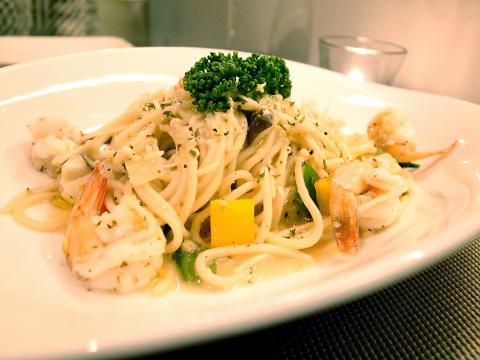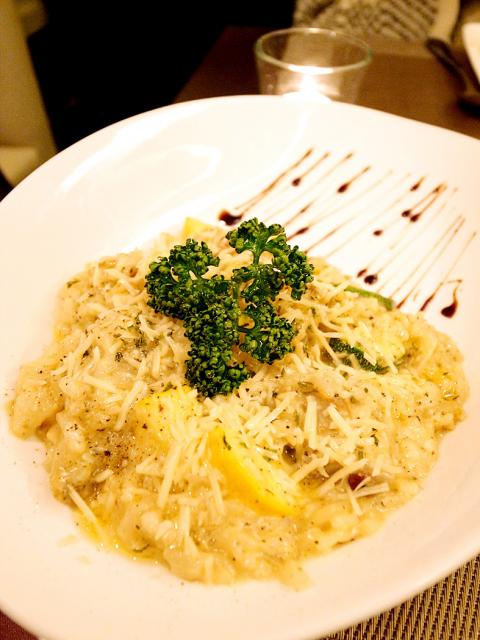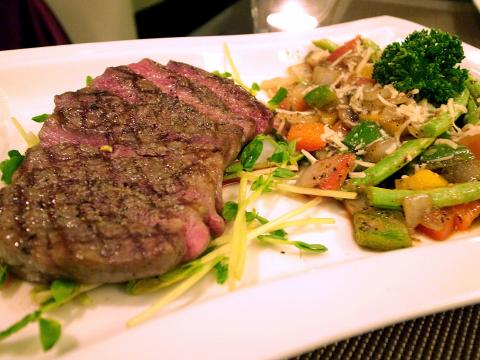Experiencing a city on a weekend or over a lifetime inevitably spells great differences. For long-time residents of Taipei, life doesn’t only involve going to Taipei 101 or dining at Din Tai Fung (鼎泰豐). At first glance, Merlot Cafe & Bistro is one of such places that can simply fall off the radar — or never appear in the first place. Ranked No. 1 on TripAdvisor among 8,865 restaurants in Taipei, the intimate bistro is a well-guarded secret among foreign visitors to the city, with relatively little coverage from local food bloggers and journalists. But a closer look reveals something that we all look for in a place to eat, drink and be merry: quality food and a friendly host who knows his customers by their first-names.
Small, homey and hidden away in a back alley off the bustling Linsen North Road (林森北路), the establishment appears modest compared to its reputation. The interior is neat, clean and, with a capacity of merely 20 dinners, can get crowded when the restaurant is full. Often, the smell of food being prepared wafts up from the open kitchen, while Bob Chau, the gracious host and an ABT (American-born Taiwanese) from California, glides between tightly packed tables, chatting with patrons about everything from food to life.
Much like the cordial service, Chau’s cooking is also a hearty fare. For appetizers, choices include the baked mozzarella (NT$280) and Merlot’s special salsa and tuna (NT$250) which is composed of salsa, creamy tuna fish and parmesan cheese with extra virgin olive oil drizzled on top. Both are served with toasted Ciabatta bread. The popular Italian style antipasto salad (NT$490) appeals to lighter appetites with a medley of salami, fresh tomatoes, basil, cucumbers, alfalfa sprouts and Parmesan cheese.

Photo: Ho Yi, Taipei Times
Featuring handmade pastas, Merlot’s kitchen offers a satisfying selection of the Italian staple. The shrimp and vegetable spaghetti (NT$300) I tried impressed with the substantial texture of the pasta cooked al dente and paired well with shrimps sauteed in white wine and with garlic, onions, bell peppers, mushrooms and basil. For a richer taste, old-school spaghetti Bolognese (NT$290) and spaghetti carbonara (NT$260) are on offer.
Another Merlot specialty is risotto, which is cooked to a creamy consistency. Chau’s rendition of the rice dish is comfortingly soft and smooth. The chicken and zucchini risotto (NT$350), for example, tasted like a piece of creamy heaven with small chunks of chicken melting instantly on the tongue. It was a soul-comforting stodge made for big appetites.
Equally filling choices are the chargrilled lamb chops (NT$590) with creamy three cheese and mushroom risotto, the grilled steak and vegetable risotto (NT$410) and the seared scallop and shrimp risotto (NT$570).

Photo: Ho Yi, Taipei Times
Determined to try out the bistro’s much lauded steak, my dining partner and I ran the risk of committing the sin of gluttony and ordered the chargrilled steak (8oz, NT$490) with sauteed seasonal vegetables. Cooked medium-rare to medium and sliced thin, the simply seasoned beef was as tender and juicy as a good piece of meat should be. And it also went well with my glass of Merlot (NT$240).
Speaking of wine, Merlot’s wine cellar contains a decent, wallet-friendly selection of whites and reds from Chile, Argentina, Germany, France, Italy, New Zealand and the US (NT$850 to NT$1,600 per bottle). There are also a few choices of sparkling wine from Germany (NT$180 per glass and NT$990 per bottle) as well as a variety of cocktails (NT$220 and NT$280) and beers (NT$100 to NT$150). For the wine illiterate, Chau doubles as the dependable sommelier, making food pairing recommendations for guests.
Offering good, hearty food, intimate service and a lovable host, Merlot Cafe & Bistro definitely draws people back, whether locals or travelers, again and again.

Photo: Ho Yi, Taipei Times

That US assistance was a model for Taiwan’s spectacular development success was early recognized by policymakers and analysts. In a report to the US Congress for the fiscal year 1962, former President John F. Kennedy noted Taiwan’s “rapid economic growth,” was “producing a substantial net gain in living.” Kennedy had a stake in Taiwan’s achievements and the US’ official development assistance (ODA) in general: In September 1961, his entreaty to make the 1960s a “decade of development,” and an accompanying proposal for dedicated legislation to this end, had been formalized by congressional passage of the Foreign Assistance Act. Two

Despite the intense sunshine, we were hardly breaking a sweat as we cruised along the flat, dedicated bike lane, well protected from the heat by a canopy of trees. The electric assist on the bikes likely made a difference, too. Far removed from the bustle and noise of the Taichung traffic, we admired the serene rural scenery, making our way over rivers, alongside rice paddies and through pear orchards. Our route for the day covered two bike paths that connect in Fengyuan District (豐原) and are best done together. The Hou-Feng Bike Path (后豐鐵馬道) runs southward from Houli District (后里) while the

The Taipei Times last week reported that the Control Yuan said it had been “left with no choice” but to ask the Constitutional Court to rule on the constitutionality of the central government budget, which left it without a budget. Lost in the outrage over the cuts to defense and to the Constitutional Court were the cuts to the Control Yuan, whose operating budget was slashed by 96 percent. It is unable even to pay its utility bills, and in the press conference it convened on the issue, said that its department directors were paying out of pocket for gasoline

On March 13 President William Lai (賴清德) gave a national security speech noting the 20th year since the passing of China’s Anti-Secession Law (反分裂國家法) in March 2005 that laid the legal groundwork for an invasion of Taiwan. That law, and other subsequent ones, are merely political theater created by the Chinese Communist Party (CCP) to have something to point to so they can claim “we have to do it, it is the law.” The president’s speech was somber and said: “By its actions, China already satisfies the definition of a ‘foreign hostile force’ as provided in the Anti-Infiltration Act, which unlike